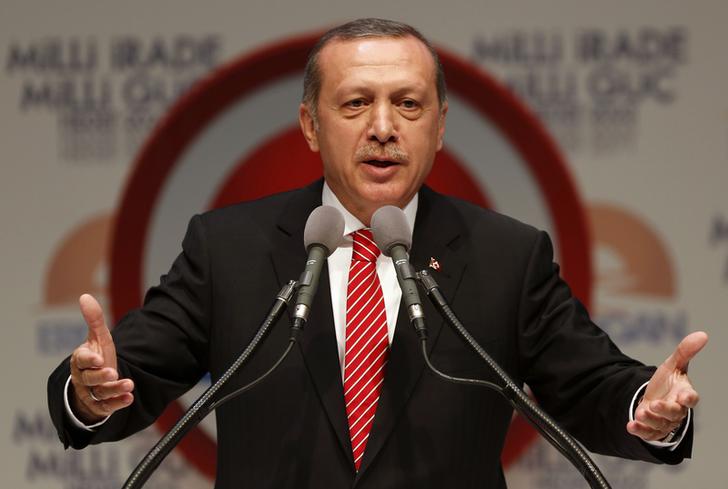Latest NEWS
- Aswat Masriya, the last word
- Roundup of Egypt's press headlines on March 15, 2017
- Roundup of Egypt's press headlines on March 14, 2017
- Former Egyptian President Hosni Mubarak to be released: lawyer
- Roundup of Egypt's press headlines on March 13, 2017
- Egypt's capital set to grow by half a million in 2017
- Egypt's wheat reserves to double with start of harvest -supply min
- Roundup of Egypt's press headlines on March 12, 2017
Erdogan says Saudi executions 'internal issue', criticises silence on Mursi's death sentence, Syria killings

Turkish President Recep Tayyip Erdogan - Reuters
CAIRO, Jan 7 (Aswat Masriya) - Turkey's President Recep Tayyip Erdogan has once again condemned "silence" about the death penalty issued against Egypt's former president Mohamed Mursi in a speech on Wednesday.
Speaking to a group of Turkish local administrators (known in Turkey as muhtars), Erogan considered the executions in Saudi Arabia an "internal matter".
The statements follow the Saudi execution of 47 people, including Shiite cleric Sheikh Nimr Al-Nimr, which caused fury in Iran and other Shiite communities. Protesters in Iran stormed the Saudi Embassy in Tehran on Saturday, setting its interior on fire, and others attacked the Saudi Consulate in the city of Messhad with Molotov cocktails.
The statements also came amid speculations in Egyptian media about a possible upcoming visit in April by Egyptian President Abdel Fattah Al-Sisi to Turkey for the Organisation of Islamic Cooperation summit. Turkey is set to preside over the summit's upcoming session, in succession to Egypt. Usual protocol requires the former presiding state of the summit to transfer the presidency to its successor.
In Wednesday's speech, aired with Arabic translation on Arabic channel TRT, Erdogan condemned the sentencing of Mursi to death, and accused the current Egyptian president of leading a coup against Mursi, and then arresting him, questioning whether he was a "terrorist" in order to face such treatment.
The Turkish president also condemned Mursi's removal from power following mass protests against his rule that started on June 30, 2013, describing it as a "coup d'état".
Egyptian-Turkish relations strained after the ouster of Mursi, who hails from the Muslim Brotherhood and who was an ally of Erdogan. Erdogan continuously criticises the post-Mursi government and has provided refuge for several Brotherhood members, who fled Egypt in fear of legal prosecution.
Egypt recalled its ambassador to Turkey in August 2013. In November of that year, Egypt informed Turkey that its ambassador is no longer welcome, thus officially downgrading diplomatic relations between both nations.
Erdogan questioned the silence of those who denounced the Saudi executions towards executions in other states.
According to the Turkish Anadolu Agency, Erdogan stated that most of those executed by Saudi Arabia were Sunnis, accused of involvement with Al-Qaeda, and warned of "invisible hands" attempting to instigate sectarian strife in the Islamic world.
Regarding Syria, Erdogan questioned the silence of "some entities" with regards to the thousands of victims in the civil war, while at the same time creating uproar for the death of one person, in reference to the Sheikh al-Nimr in Saudi Arabia.
Turkey cancelled the capital punishment in 2004, two years after Erdogan's Justice and Development Party (AKP) came to power. Turkey has been undergoing negotiations for years in order to join the European Union (EU). Cancelling the punishment is among the EU membership's preconditions.










